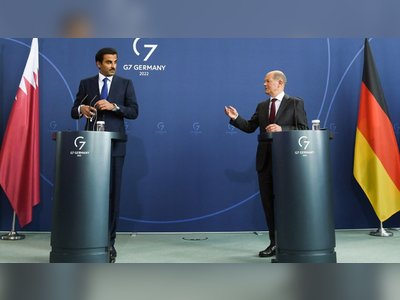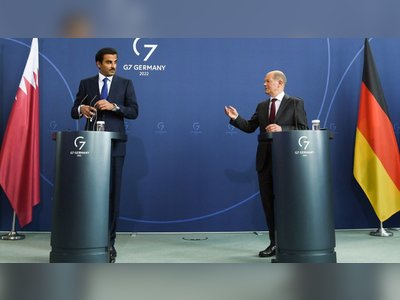Germany Enters Fiscal Crisis as Cabinet Approves €174 Billion in New Debt
2026 budget reveals record borrowing, collapsing welfare math, and the unraveling of Germany’s austerity legacy
Germany’s federal cabinet has passed the 2026 budget, authorizing €174.3 billion in new borrowing—the largest in the country’s postwar history.
The increase, masked by off‑budget vehicles and special funds, represents a dramatic departure from the constitutional debt brake and the long-standing commitment to fiscal discipline.
The health insurance system is running a €47 billion deficit, with no structural reforms announced.
Instead, government officials confirmed that the shortfall will be covered through additional borrowing and reallocations from special purpose funds.
Germany’s five statutory health insurers, already strained by rising costs and demographic shifts, face insolvency warnings from internal reports issued earlier in 2025.
Social contributions now consume 42.5 percent of gross worker income, yet fail to stabilize the pension, unemployment, and long-term care systems.
The pension fund alone is projected to require €128 billion in federal top-ups by 2026, nearly double its 2018 level.
Despite this, no increase in the retirement age or overhaul of the contribution base is included in the 2026 fiscal framework.
The €520.5 billion spending plan marks a 10 percent increase over 2025 levels, while the structural deficit continues to widen.
Berlin has turned to creative accounting methods, including transferring liabilities to off‑budget infrastructure and energy transition funds, to bypass legal borrowing caps.
These special funds now total more than €900 billion in cumulative debt obligations.
Germany’s debt-to-GDP ratio is expected to rise to 73.8 percent by Q4 2026, up from 64.3 percent in early 2024, reversing years of post-euro crisis consolidation.
Core inflation remains above 3.1 percent, driven in part by public sector wage hikes and energy subsidies embedded in the special fund structure.
Defence spending, shielded from debt brake limits via the €100 billion Bundeswehr fund, will increase to €75 billion in 2026.
Long-term projections suggest a €161.8 billion annual defence budget by 2029, accounting for more than 3.5 percent of GDP.
Labour force participation remains stagnant, with immigration-fueled population growth failing to offset a shrinking native workforce.
The Federal Employment Agency warned in June that job market integration costs for new arrivals had surpassed €11 billion annually.
In its current form, the 2026 budget signals a full reversal of Germany’s past role as the Eurozone’s fiscal disciplinarian.
The same government that once imposed austerity benchmarks on southern European economies now finds itself relying on expanded borrowing, stealth taxation, and unsustainable welfare spending to stay afloat.
The Bundestag is expected to begin formal debate on the budget package in September, with votes scheduled for final adoption before December.
No alternative fiscal framework has been presented.
The increase, masked by off‑budget vehicles and special funds, represents a dramatic departure from the constitutional debt brake and the long-standing commitment to fiscal discipline.
The health insurance system is running a €47 billion deficit, with no structural reforms announced.
Instead, government officials confirmed that the shortfall will be covered through additional borrowing and reallocations from special purpose funds.
Germany’s five statutory health insurers, already strained by rising costs and demographic shifts, face insolvency warnings from internal reports issued earlier in 2025.
Social contributions now consume 42.5 percent of gross worker income, yet fail to stabilize the pension, unemployment, and long-term care systems.
The pension fund alone is projected to require €128 billion in federal top-ups by 2026, nearly double its 2018 level.
Despite this, no increase in the retirement age or overhaul of the contribution base is included in the 2026 fiscal framework.
The €520.5 billion spending plan marks a 10 percent increase over 2025 levels, while the structural deficit continues to widen.
Berlin has turned to creative accounting methods, including transferring liabilities to off‑budget infrastructure and energy transition funds, to bypass legal borrowing caps.
These special funds now total more than €900 billion in cumulative debt obligations.
Germany’s debt-to-GDP ratio is expected to rise to 73.8 percent by Q4 2026, up from 64.3 percent in early 2024, reversing years of post-euro crisis consolidation.
Core inflation remains above 3.1 percent, driven in part by public sector wage hikes and energy subsidies embedded in the special fund structure.
Defence spending, shielded from debt brake limits via the €100 billion Bundeswehr fund, will increase to €75 billion in 2026.
Long-term projections suggest a €161.8 billion annual defence budget by 2029, accounting for more than 3.5 percent of GDP.
Labour force participation remains stagnant, with immigration-fueled population growth failing to offset a shrinking native workforce.
The Federal Employment Agency warned in June that job market integration costs for new arrivals had surpassed €11 billion annually.
In its current form, the 2026 budget signals a full reversal of Germany’s past role as the Eurozone’s fiscal disciplinarian.
The same government that once imposed austerity benchmarks on southern European economies now finds itself relying on expanded borrowing, stealth taxation, and unsustainable welfare spending to stay afloat.
The Bundestag is expected to begin formal debate on the budget package in September, with votes scheduled for final adoption before December.
No alternative fiscal framework has been presented.
AI Disclaimer: An advanced artificial intelligence (AI) system generated the content of this page on its own. This innovative technology conducts extensive research from a variety of reliable sources, performs rigorous fact-checking and verification, cleans up and balances biased or manipulated content, and presents a minimal factual summary that is just enough yet essential for you to function as an informed and educated citizen. Please keep in mind, however, that this system is an evolving technology, and as a result, the article may contain accidental inaccuracies or errors. We urge you to help us improve our site by reporting any inaccuracies you find using the "Contact Us" link at the bottom of this page. Your helpful feedback helps us improve our system and deliver more precise content. When you find an article of interest here, please look for the full and extensive coverage of this topic in traditional news sources, as they are written by professional journalists that we try to support, not replace. We appreciate your understanding and assistance.











